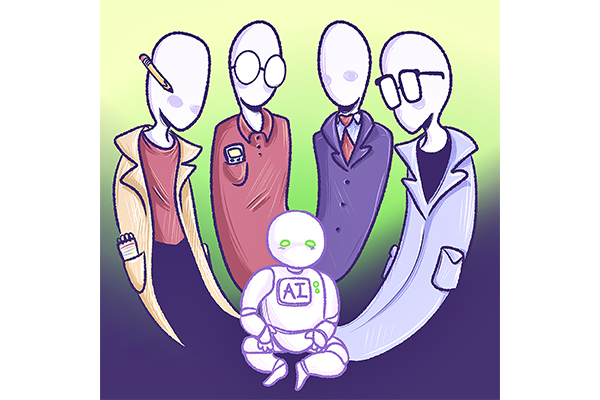Good Systems, the third grand challenge in the Bridging Barriers initiative, was launched in a campus-wide email Friday by Daniel Jaffe, the vice president for research for the Office of the Executive Vice President and Provost.
The Bridging Barriers initiative, first planned in 2016, takes three broad research themes and uses UT researchers from all disciplines to try to solve world issues in eight years. First announced Sept. 18 by UT President Gregory Fenves during the 2019 University Address, Good Systems is a multidisciplinary, campus-wide project which focuses on how to ethically use artificial intelligence to society’s benefit.
Kenneth Fleischmann, faculty chair for the Good Systems executive team and School of Information professor, said focusing on ethical technology is an important endeavor because of how ingrained artificial intelligence is in everyday life. He cited an AI-based technology created to predict the likelihood of criminals becoming repeat offenders which used racially biased algorithms based on historically racist data.
“We’ve come to appreciate in society that technology in general, AI in particular, is a life and death matter,” Fleischmann said. “We don’t have very many ethical checks on IT development. If you want to release a new app on the app store, you just need Apple to approve it. It’s tremendously easy to release a new software product, but it could have very severe, potentially life-threatening consequences.”
Students, staff and faculty from a majority of UT’s schools and colleges are collaborating on the Good Systems project by researching smaller projects called one-year funded projects. Fleischmann said 10 projects, each granted $100,000, are the focus of this year’s research, with topics ranging from understanding misinformation to determining urban health risks. Anyone at UT can propose ideas for future projects during the next proposal call-out,
Fleischmann said.
Jaewon Choi, a radio-television-film graduate student, said he became involved with Good Systems through his advisor Sharon Strover, a Good Systems executive team member. He said he worked on a project called Disinformation in Context: AI, Platforms and Policy for about a year, focusing on political advertisements and profiles containing misinformation given to Congress after being released to Facebook by Russian-related organizations, particularly the Information
Research Agency.
“(This project) is a very timely issue which is engendering quite controversial debates throughout our society involving growing development of AI technology behind all the platforms, especially social media platforms, people tend to use without understanding what’s been going on inside them,” Choi said. “The (project’s) about how social media has been potentially used in a malicious way by other actors is an important subject matter. (It’s an) important first step of developing good (AI) systems that could benefit our society.”
The Good Systems project also contains an education advisory committee to involve more graduates and undergraduates, Fleischmann said. He and architecture associate professor Junfeng Jiao are teaching a signature course called Ethics of AI: Theorizing Good Systems this fall.
“One thing that’s important to me about our approach to ethics is that it’s very diverse,” Fleischmann said. “We don’t rely totally on dead white men, but we make sure that we have a globally, broadly comprehensive set of ethical perspective. For example, (we will be) including non-Western and feminist thought optical theories that often date back thousands of years and are quite active and useful today.”
Editor's Note: An earlier version of this article incorrectly said Kenneth Fleischmann was associate professor. The Texan regrets this error.




















